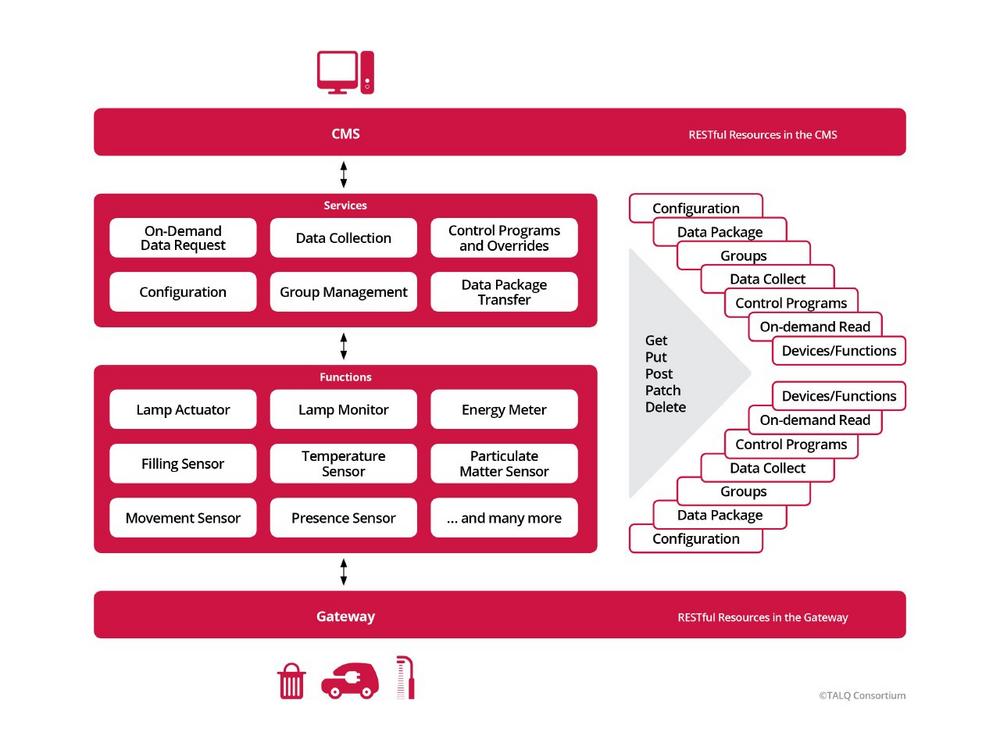Cities on their way to becoming smart cities want to invest in future-proof, interoperable solutions. As many of the currently available solutions are proprietary, the TALQ Consortium decided to develop the Smart City Protocol to unify multifarious smart city requirements including device commissioning, configuration, control, command, monitoring, scheduled programs as well as data collection. Thanks to this software protocol, cities will be able to choose from device networking solutions available from multiple vendors and control them all through a single Central Management Software (CMS) instance.
The TALQ Smart City Protocol offers several benefits: first of all a flexible data model that is applicable to a wide range of sectors and many different uses cases, such as outdoor lighting control, waste collection, parking space detection, environmental data collection, energy management and more. that include a set of agreed configuration, operational and metering attributes and events. These functions
a RESTful approach makes it easy to integrate in both existing CMS and Gateways. To enable configuration, control, command and monitoring by any TALQ-compliant CMS, the Specification provides secure HTTP REST GET, PUT, POST, PATCH and DELETE requests and associated JSON data payloads.
Furthermore TALQ provides a comprehensive certification program and associated test tools to prove interoperability. This is not only invaluable for vendors during their implementation process, but gives end-customers, such as cities, the assurance that the selected solutions are truly compatible.
While the detailed TALQ Specification is available only for TALQ member companies, the White Paper can be found in the public domain of the TALQ website.
Founded in 2012, the TALQ Consortium is establishing a globally accepted standard for management software interfaces to control and monitor heterogeneous smart city applications. The TALQ Smart City Protocol is a specification for information exchange, suitable for implementation in various products and systems. This way interoperability between Central Management Software (CMS) and Outdoor Device Networks (ODN) from different vendors will be enabled, such that a single CMS can control different ODNs in different parts of a city or region.
TALQ is an open industry consortium consisting of currently the following member companies:
Current – powered by GE, Dhyan, Harvard Engineering, Schréder, Itron, Telensa, UVAX Concepts, Bouygues, BeeZeeLinx, efacec, Energies et Services, CAOS Computersoftware, CAPELON, Cimcon Lighting, citelum Citégestion, DimOnOff, Flashnet, Future Intelligence, HEI Technology International, infomir, LED Roadway Lighting, Lightronics, Lucy Zodion, Mayflower Complete Lighting Control, Neptun Light, NETAS, novaccess, Petra Systems, SELC Ireland, Streetlight Vision, Sinapse Energia, smartnodes, Telematics Wireless, TRIDIUM, Trilliant, UMPI, Unicoba Energia, zumtobel group.
TALQ Consortium
445 Hoes Lane
USANJ 08854 Piscataway, NJ
Telefon: +1 (732) 4655817
Telefax: +1 (732) 981-9473
http://www.talq-consortium.org/
TALQ Communications Consultant
E-Mail: talk2@talq-consortium.org
